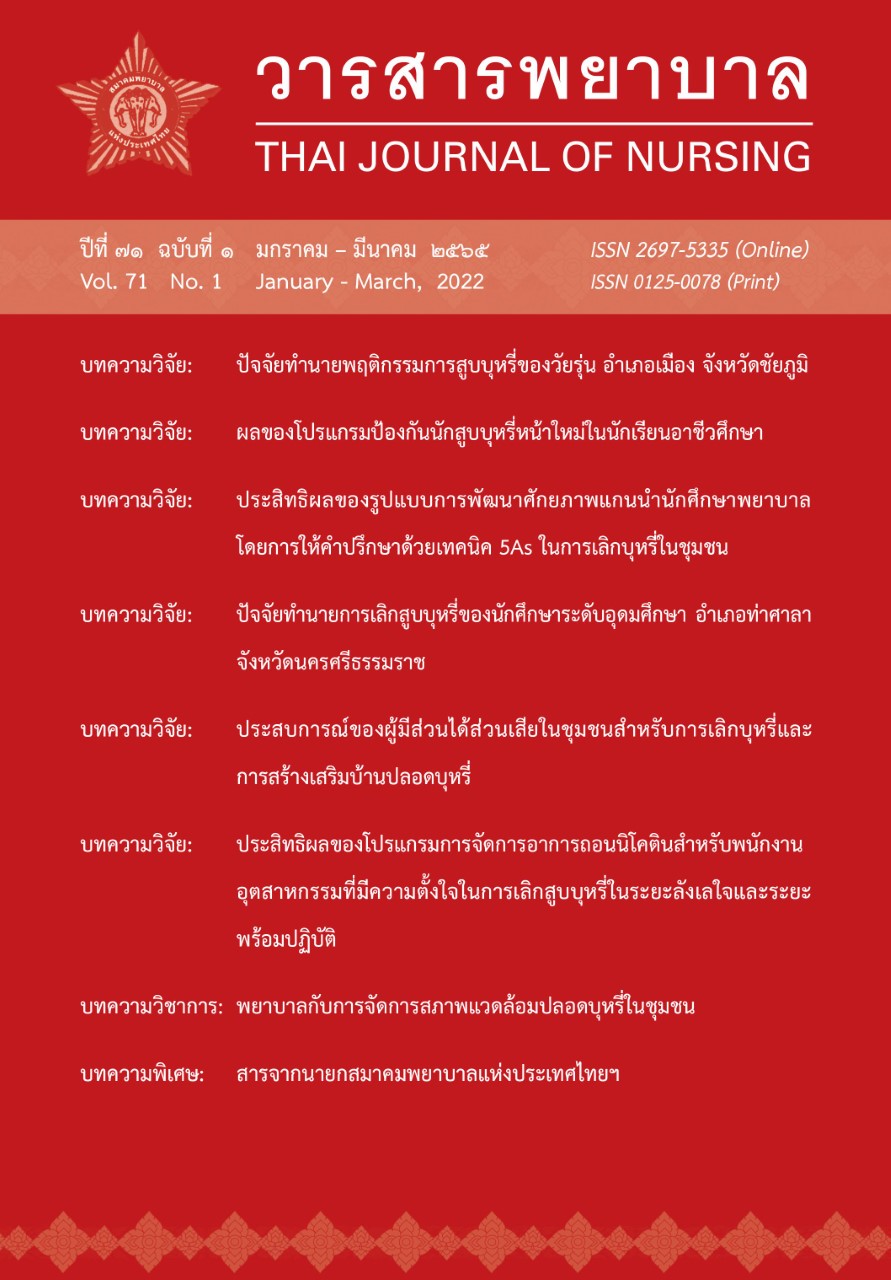Nurse and the smoke-free environmental management in community
Main Article Content
Abstract
Smoking is a major risk factor for all current smokers and also produces air pollution of secondhand smoke and third-hand smoke which affects non-smokers’ health. Environmental management in community, including physical, biological, social, culture and community lifestyles, is important to diminish risk factors and prevent non-smokers’ health from tobacco hazards. Nurses possess important professional responsibilities of health promotion, disease prevention, treatment and rehabilitation to initiate smoke-free environmental management in community. This article gathers knowledge from researcher work and literature reviews to propose a nurse’s role guideline for smoke-free environmental management in community. This guideline might affect the reduction of health risks and health prevention from tobacco smoke hazard.
Article Details

This work is licensed under a Creative Commons Attribution-NonCommercial-NoDerivatives 4.0 International License.
References
กระทรวงทรัพยากรธรรมชาติและสิ่งแวดล้อม กรมควบคุมมลพิษ. (2561). โครงการศึกษาแหล่งกำเนิดและ
แนวทางการจัดการฝุ่นละอองขนาดไม่เกิน 2.5 ไมครอน ในพื้นที่กรุงเทพและปริมณฑล. กรุงเทพ
มหานคร: ผุ้แต่ง.
กระทรวงสาธารณสุข ศูนย์กฎหมาย กรมควบคุมโรค. (2560). พระราชบัญญัติควบคุมผลิตภัณฑ์ยาสูบ พ.ศ.
กรุงเทพมหานคร: โรงพิมพ์แห่งจุฬาลงกรณ์มหาวิทยาลัย.
กระทรวงสาธารณสุข กรมอนามัย. (2562). จัดสภาพแวดล้อมให้เอื้อต่อการมีสุขภาพดี [วิดีโอ]. สืบค้นเมื่อ
เมษายน 2564, จาก https://multimedia.anamai.moph.go.th/videoknowledges/doh_workingage_
healthy-workplace/
ชณิษฐ์ชา บุญเสริม, ผกามาศ สุฐิติวนิช, และวรษา รวิสานนท์. (2552). การสำรวจพฤติกรรมการสูบบุหรี่
ของเยาวชนในจังหวัดชัยภูมิ. วารสารวิจัยทางวิทยาศาสตร์สุขภาพ, 3(2), 6–14.
ประกิต วาทีสาธกกิจ. (2560). ข้อมูลบุหรี่กับสุขภาพ. กรุงเทพมหานคร: ฑีรกานต์กราฟฟิค.
ศิริวรรณ ทิทยรังสฤษฏ์, และปวีณา ปั้นกระจ่าง. (2561). รายงานสถิติการบริโภคยาสูบของประเทศไทย
พ.ศ. 2561. กรุงเทพมหานคร: เจริญดีมั่นคงการพิมพ์.
ศูนย์วิจัยและจัดการความรู้เพื่อการควบคุมยาสูบ. (2562). ข่าวสารบุหรี่. สืบค้นเมื่อ 21 เมษายน 2564, จาก
http://www.trc.or.th/th/ข่าวสาร/ข่าวเผยแพร่/ข่าวสารบุหรี่
ศูนย์วิจัยและจัดการความรู้เพื่อการควบคุมยาสูบ. (2563). รายงานสถานการณ์การการบริโภคยาสูบของ
ประเทศไทย พ.ศ. 2562. กรุงเทพมหานคร: สินทวีกิจ พริ้นติ้ง.
สุปาณี เสนาดิสัย, และสุรินธร กลัมพากร. (2563). บุหรี่กับสุขภาพ: พยาบาลกับการควบคุมการบริโภค
ยาสูบ. นนทบุรี: สื่อตะวัน.
แอนน์ จิระพงษ์สุวรรณ. (2561). สภาพแวดล้อมในการทำงานและความเสี่ยงทางสุขภาพ: หลักการและ
การประยุกต์ใช้ทางการพยาบาลอาชีวอนามัย. กรุงเทพมหานคร: แดเน็กซ์อินเตอร์คอร์ปอเรชั่น.
American Lung Association. (2020). Smoke free environment. Retrieved April 21, 2021, from
https://www.lung.org/policy-advocacy/tobacco/smokefree-environments
World Health Organization. (2003). WHO Framework convention on tobacco control. Geneva,
Switzerland: WHO Document Production Services. Retrieved April 21, 2021, from
http://apps.who.int/iris/bitstream/handle/10665/42811/9241591013.pdf;jsessionid=99E4BB48E5C4
D33889F3BC9A7A4DCEF?sequence=1 W
World Health Organization. (2009). WHO report on the global tobacco epidemic, 2009: Implementing
smoke-free environments. fresh and alive mpower. New York: Bloomberg L.P.
World Health Organization. (2013). WHO Framework convention on tobacco control. Geneva,
Switzerland: Author.
World Health Organization. (2016). Secondhand smoke. Retrieved April 21, 2021, from
https://www.who.int/quantifying_ehimpacts/publications/SHS.pdf
World Health Organization. (2017). Determinant of health. Retrieved April 21, 2021, from
https://www.who.int/news-room/q-a-detail/determinants-of-health
World Health Organization. (2020). Tobacco. Retrieved April 21, 2021, from
https://www.who.int/news- room/fact-sheets/detail/tobacco


